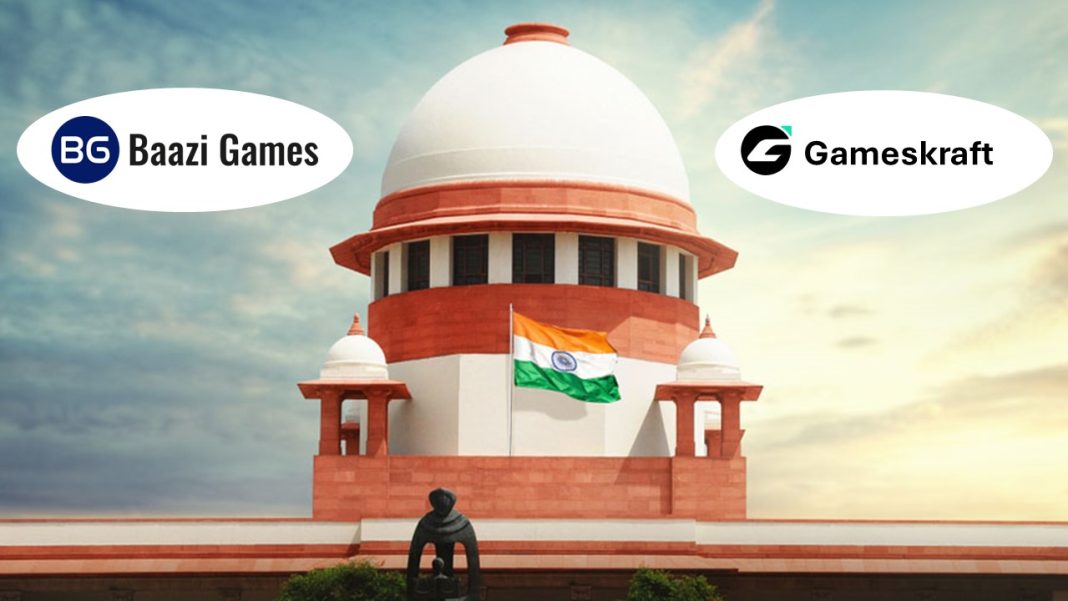SC Puts GST Demand on Hold for Baazi Games Until Final Decision in Gameskraft Case
The Supreme Court has temporarily stopped a Rs. 123 crore GST notice sent to Baazi Games, an online gaming company. The notice claimed that the company was involved in activities related to betting.
The Court gave this relief because it is already about to give a final decision in another similar case, the Gameskraft case, which will decide how online skill-based games should be taxed under GST (up to September 2023).
The bench of Justice J.B. Pardiwala and Justice K.V. Vishwanathan said that since the main issue is already being decided, no action should be taken against Baazi Games until the final judgement is announced.
Baazi Games challenged the show-cause notice (SCN) issued by the tax authorities on several constitutional and jurisdictional grounds. Baazi Games argued that the Rs. 123 crore GST notice was not valid because the rule was based on Rule 31A(3).
The company said that this rule, which deals with how to calculate tax on betting and gambling, doesn’t match the main GST law (Sections 15(1) and 15(5)), which says tax should be based on the actual transaction value.
They also claimed that Section 15(5) of the GST law goes against the Constitution (Article 246A), which decides how Parliament and state governments can make GST laws. According to Baazi Games, this section messes up the idea of having a uniform tax system across the country.
Their lawyers further argued that the tax authorities should not have gone ahead with a personal hearing, because the Supreme Court’s pending decision in the Gameskraft case will directly affect Baazi Games’ case.
The Rs. 123 crore tax demand against Baazi Games is part of a larger crackdown by the GST department on online gaming companies. Since 2022, the tax authorities have sent several such notices.
The government has argued that the entire amount collected from players should be taxed at 28%, because they consider these games to fall under “betting and gambling.”
However, gaming platforms have usually maintained that skill-based games, including poker, rummy, or fantasy sports, are different from gambling and should be taxed as online entertainment services at a lesser rate.
The stay order is seen as a part of a broader judicial trend of granting relief to gaming companies until the Supreme Court makes a final decision in the Gameskraft case.
Sandeep Sehgal (Partner-Tax at AKM Global) said the Court’s intervention underscores judicial prudence in allowing a uniform approach.
He added, “The Supreme Court’s stay on the Rs 123 crore GST notice issued to Baazi Games adds to the growing judicial pushback against tax demands in the online gaming sector. In line with earlier interim orders, the Court has halted proceedings and emphasized that such matters should wait until the Gameskraft verdict, which will decide whether skill-based games can be classified as gambling under GST.” He further added, “This order reinforces consistency in the Court’s approach and brings a measure of clarity to an industry grappling with multiple investigations and uncertainty over how online skill-based games are to be taxed.”
The online gaming industry, whose valuation is over Rs 25,000 crore, has faced multiple tax notices collectively exceeding Rs 1.5 lakh crore. Several companies have shown their concern that the retrospective application of the 28% tax on full-faced value could destroy the sector.
The Gameskraft case is a big legal battle over an Rs. 21,000 crore tax demand. The outcome will decide an important question: whether games of skill should be taxed the same way as games of chance. The decision will also affect the recent ban on online money gaming, which the Supreme Court is still reviewing.Until the Supreme Court gives its final verdict, the Baazi Games stay order means that no new enforcement actions will be taken for now, giving the online gaming industry a temporary break from legal pressure.
Currently, everyone from gaming companies to tax authorities is waiting for the Gameskraft ruling, which will set the direction for how online gaming is taxed and regulated in India going forward.



